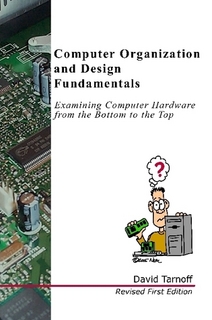
|
FreeComputerBooks.com
Links to Free Computer, Mathematics, Technical Books all over the World
|
|
- Title: Computer Organization and Design Fundamentals: Examining Computer Hardware from the Bottom to the Top
- Author(s) David L. Tarnoff
- Publisher: Lulu.com; First Edition with Revisions (January 20, 2011)
- Hardcover/Paperback: 434 pages
- eBook: PDF (432 pages, 2.1 MB)
- Language: English
- ISBN-10/ASIN: 1411636902
- ISBN-13: 978-1411636903
- Share This:

|
This book takes the reader from the basic design principles of the modern digital computer to a top-level examination of its architecture.
This book can serve either as a textbook to an introductory course on computer hardware or as the basic text for the aspiring geek who wants to learn about digital design.
he material is presented in four parts. The first part describes how computers represent and manipulate numbers. The second part presents the tools used at all levels of binary design. The third part introduces the reader to computer system theory with topics such as memory, caches, hard drives, pipelining, and interrupts. The last part applies these theories through an introduction to the Intel 80x86 architecture and assembly language.
The material is presented using practical terms and examples with an aim toward providing anyone who works with computer systems the ability to use them more effectively through a better understanding of their design.
About the Authors- N/A
- Computer System, Organization, and Architecture
- Computer Hardware, Personal Computers, and the History of Computers
- Assembly and Machine Languages
- Electronics and Chips Design/Programming
- Computer Operating Systems
- Electronic and Computer Engineering

- Computer Organization and Design Fundamentals (David L. Tarnoff)
- The Mirror Site (1) - PDF
- The Mirror Site (2) - PDF
-
 Basic Computer Architecture (Smruti R. Sarangi)
Basic Computer Architecture (Smruti R. Sarangi)
This book is a comprehensive text on basic, undergraduate-level computer architecture. It includes the combinational units, ALUs, processor, basic 5-stage pipeline, and a microcode-based design.
-
 Principles of Computer System Design: An Introduction (J. Saltzer)
Principles of Computer System Design: An Introduction (J. Saltzer)
This book takes a principles-based approach to the computer system design. Through carefully analyzed case studies from each of these disciplines, it demonstrates how to apply these concepts to tackle practical system design problems.
-
 Computer Systems: A Programmer's Perspective, 2nd Edition
Computer Systems: A Programmer's Perspective, 2nd Edition
This book introduces the important and enduring concepts that underlie computer systems by showing how these ideas affect the correctness, performance, and utility of application programs.
-
 The Elements of Computing Systems: Building a Modern Computer
The Elements of Computing Systems: Building a Modern Computer
This book gives a refreshingly new way of looking at computer systems as a whole by considering all aspects of a complete system in an integrated manner, as its comes to play in the construction of a simple yet powerful computer system.
-
 Scientific Programming and Computer Architecture
Scientific Programming and Computer Architecture
The book digs into linkers, compilers, operating systems, and computer architecture to understand how the different parts of the computer interact with programs. It begins with a review of C/C++ and explanations of how libraries, linkers, and Makefiles work.
-
 How Computers Work: Processor and Main Memory, 2nd Edition
How Computers Work: Processor and Main Memory, 2nd Edition
This book starts out very simple and gets more complex as it goes along, but everything is explained. The processor and memory are mainly covered. It explains in great detail the operation of a simple but functional computer.
-
 The Secret Guide to Computers (Russ Walter)
The Secret Guide to Computers (Russ Walter)
It's the one book that covers everything today's beginners and near-beginners need to know: not just about Windows, but also about software, hardware, and the Internet. It explains complicated concepts simply and clearly, and empowering beginners.





